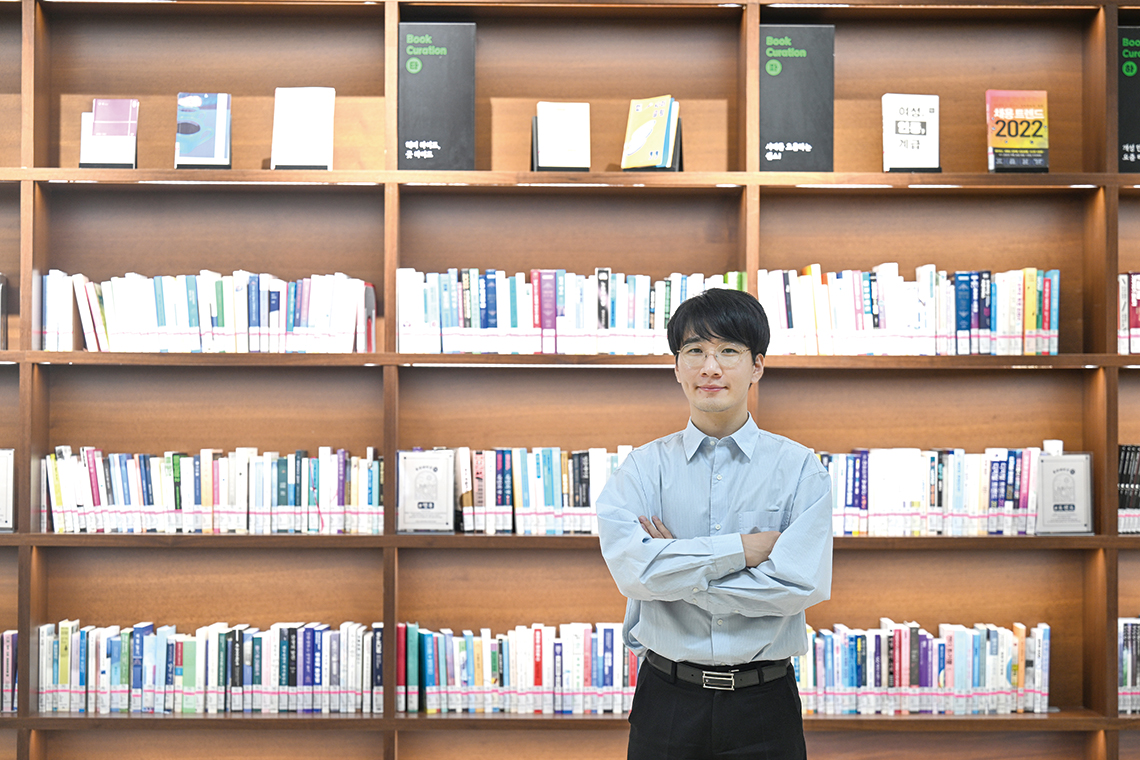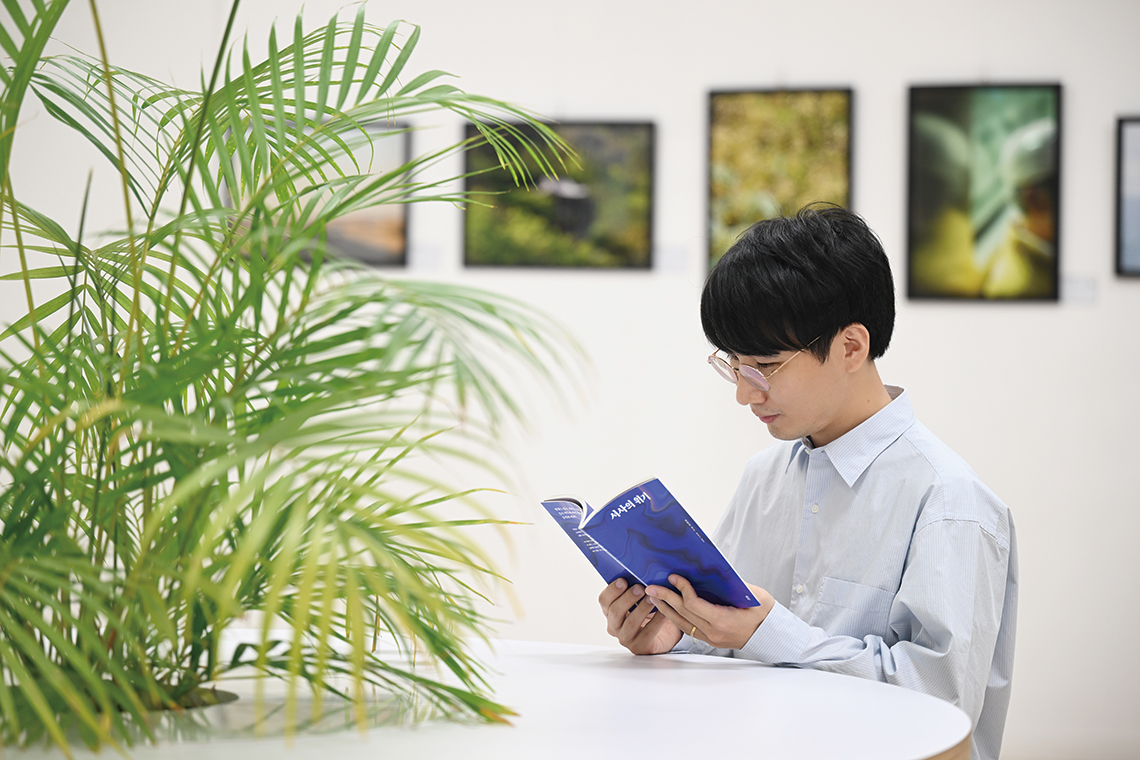
- Inside & UNIST
- Take “Knowledge”, Keep “Experience” Alive,
and Protect Humanity through Critical Reflection
본문영역
Take “Knowledge,” Keep “Experience” Alive,
and Protect Humanity through Critical Reflection
Drawing the Future with AI
The word “science” has an icy connotation. However, our lives have become richer and better because of technology, which organically infused itself into our daily lives. Scholars have begun “reflecting” on the significance and effects of technology on a regular basis. Amid the increased anxiety in recent years about whether “we will be consumed by AI” or “be buried in its results,” what are front-line researchers thinking? Considering the “valuable experiences” that can improve lives, we requested Professor Kong Tae-sik of the Department of Computer Science & Graduate School of Artificial Intelligence to consider this issue.
- Written by _ the Editorial Office Photo _ Yoo Geun-jong

AI in Everyday Life, Between Innovation and Ethics
In the wake of the COVID-19 pandemic, digital technology started pervading everyday life, and has since evolved into “artificial intelligence (AI).” Since then, artificial intelligence has been influencing society more than we are realizing it. In the financial sector, big data analysis has allowed consumers to select the best products for themselves. In the medical industry, image analysis technology has increased treatment accuracy and efficiency by identifying cancer and other disorders early. Moreover, the manufacturing industry has improved work efficiency through AIbased automation systems, and educational institutions are offering personalized learning and personality-specific content. As AI has become an essential tool in our daily lives, bringing genuine value to a wide range of industries, we can look forward to a better life with the benefits of technology.
Naturally, there are also worries that AI would result in a loss of emotional ties and humanity. The ubiquitous AI laboratory's director, Professor Kong Tae-sik, who was hired in August 2024, stresses a “human-centered” strategy that considers both technological progress and AI's ethical responsibility.

AI Innovation Meets Human-Centric Technology: On-Device
Professor Kong, who studied on-device artificial intelligence during his master's and doctoral studies, is currently developing AI technologies that provide ubiquitous, more efficient, and customized user experiences. Furthermore, he introduced the scope as various on-device AI, such as “AI applications”, “AI personalization”, and “efficient AI systems.” As a result, Professor Kong explained that his research aims to be “human-centered” towards the user. As a so-called “digital native”1, the development of smart devices that he has witnessed so far has convinced him of the proposition that “Technology is a means to provide a better service, and its development contributes to improving the quality of our lives.”
Professor Kong specifically reflected on the situation in 2007, when the concept of wireless devices evolved with the release of the iPhone, and, in 2009, when mobile devices began to dominate the Internet of Things (IoT).
“I was about to start studying in college. At that time, there was plenty of research on hardware-oriented design, software systems, and algorithms. By the time I graduated, AI was on the rise, and, in March 2016, when I entered graduate school, the world was abuzz with the match between Lee Se-dol and AlphaGo. At a time when interest in AI was exploding, I naturally began to explore various topics. That's how my relationship with AI began.”
- 1.
- A generation that lived through a digital technology environment since birth. They naturally use digital devices such as computers, the Internet, and smartphones, and easily understand and adapt to digital culture. They are proficient in various digital activities, such as information searching, social media, and online communication, and they know how to use digital technology actively in their daily lives and in learning. They can respond quickly to rapid changes in digital technology, and they are distinguished by acquiring new knowledge and skills through experience in the digital environment.
Evolution of Technology: It Is Time to Consider the Coexistence of AI and Humans
As smartphones gained popularity in 2009, “smart” gadgets started permeating every aspect of our everyday life. Professor Kong said that research on how people engage with gadgets grew active as ubiquity, the Internet of Things, and autonomous driving became popular phenomena. Furthermore, AI, which has drawn increased attention due to cutting-edge technology like deep learning and AlphaGo, has advanced to a new level of discussion after the COVID-19 pandemic. Subsequently, Professor Kong went on to say that since technology has the power to alter our lives significantly, there are increasing voices advocating for its responsible handling rather than treating it as a single technology.
“Technology and science are ultimately about ‘humans’ and ‘a better life.’” Sometimes it seems that “flexible and emotional” people are left out because of its “fast, accurate, and error-free” character, yet it never wavers in its commitment to our lives. This appears to be the starting point of the researchers' concerns and contemplations.
More than anyone else, researchers want to ensure that the concept of technology as “dehumanization” and the core of science as “selfishness of civilization” are not at odds.

CONSIDERING
THE COEXISTENCE OF
AI AND HUMANS
Critical Activity Prevents Lack of Experience
Everything has two sides. The more advanced and potent a technology like artificial intelligence is, the more evident its benefits and drawbacks are. AI is undoubtedly a useful tool that boosts productivity and creates new opportunities, but it also has drawbacks in terms of privacy, employment, and other moral concerns.” Thus, while we move through the phase of digital transformation and enjoy the use of AI's convenience and innovation, we must have a thorough awareness of “coexistence with AI”, and acknowledge that we are confronted with moral dilemmas and obligations. In this context, Professor Kong advises distinguishing between “knowledge” and “experience”.
“On the surface, it appears like AI will enable us to live quick, accurate, and error-free lives. However, I believe that we must keep in mind that AI's potential is ultimately limited. For example, it might be quick and precise in learning new information or knowledge, but you will unavoidably lose out on experience in thinking and planning. If obtaining those objectives is a significant aspect of human life, it's not just about outcomes; it's also about the mistakes we make, and the lessons we learn along the way.”
Professor Kong stresses “distinguishing whether what I want is knowledge or experience” when discussing AI technology. If you need knowledge, use it “smartly”, but if you don't want to miss out on experience, you need to actively engage in some kind of concern, activity, or discussion that satisfies that part. In other words, we must use critical thinking and reflection to act on subjective judgments on “acceptance and rejection” or “correction and supplementation”, as opposed to mindlessly accepting the outcomes of AI.
For this reason, Professor Kong cited an anonymous author’s book to emphasize the importance of critical reflection that is necessary in the era of AI transformation. “In this smart system of domination, without oppression or resistance, the end of a society where I don't speak my thoughts, feelings, and emotions is an empty life without a narrative.”2 The depth of reflection seemed to be indicated from Professor Kong’s expression as he said such words.
- 2.
- Han Byeong-cheol, 『Crisis of Narrative』, Dasanchodang, 2024, Translator's Foreword

